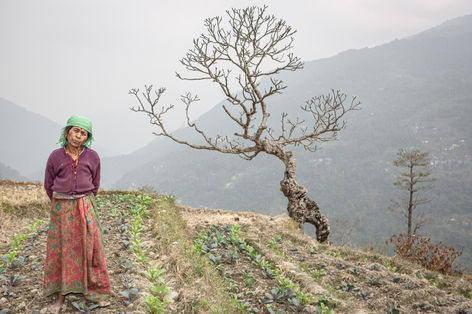Food
Feeding the world's largest food market is a growing challenge as rising income levels across Asia result in a shift towards environmentally intensive diets. The emissions of Earth-warming gases by Asia's agrifood systems already rose by a quarter between 2000 and 2022. The global food supply chain, from farm to fork to disposal, accounts for 30% of total emissions caused by humans.
And it is already taking a toll on the region's agriculture. The gradual increase in global average temperatures, which fossil fuel-based farming and land conversion have contributed to, could reduce yields of India's rainfed rice by 47% in 2080.
The following are excerpts from reports conducted on food production in Asia.
All images © Sebastian Castelier
Poisoned by India’s Green Revolution
India 🇮🇳 - "That night, I ran for my life. I was throwing up and all I could see with my eyes barely open was the street full of dead bodies." recalls Noor Jahan, a survivor of the leaks of more than 40 tons of methyl isocyanate and other toxic gases from a pesticides plant in 1984. The Union Carbide plant in Bhopal was instrumental in the spread to Madhya Pradesh of fossil fuel-based farming, known as the 'Green Revolution' movement.
"The Bhopal disaster made it clear just how dangerous these chemicals are. And yet for decades I have been riding the prevailing trend in India to increase yields. Today, I feel guilty", said Mishri Lal Rajput, a farmer in Bhopal. Although Madhya Pradesh now leads in organic farming in India, fossil fuel-based farming continues to shape the agricultural landscape. Lal Rajput added: "In a way, we are causing a 'slow Bhopal disaster', because we don't know how to get out of chemical agriculture."
The Perils of a Hasty Transition
Sri Lanka 🇱🇰 - After decades of reliance on fossil fuel-based farming. Sri Lanka took a 180° turn in 2021. It abruptly banned the import of chemical fertilizers and pesticides, requiring farmers to shift overnight to organic farming. The unprepared transition led to a 20% drop in agricultural output the next year.
The crisis revealed how dependent to fossil fuel-based farming Sri Lanka had become. “Like many others, I import hybrid seeds from Japan, the U.S. and France that cannot grow without fertilisers.” said vegetable farmer Anindha Weerasinghe. Other farmers lamented additional manual labour and lower profits. The transition to organic farming — which typically yields about 22% less — requires careful preparation as it involves changes in farming practices. However, it offers substantial environmental benefits. For example, a field that is organically farmed is home to over three times more plant species than a conventional one.
Decoupling India's Fields from West Asian Gas
India 🇮🇳 - "Intensive agriculture has become a kind of religion that cannot be criticised," laments Umendra Dutt, founder of Kethi Virasat Mission, an organic farming NGO. India's shift towards fossil fuel-based farming from the 1960s played a vital role in ending chronic food shortages. But it has come at a steep environmental cost, including groundwater depletion and soil degradation that led to a rise in nitrous oxide (N2O) emissions.
"Our fields have become addicted to chemical inputs. The Green Revolution was a trap," analyses Dharminder Singh Deol, a citrus farmer in Punjab where the Green Revolution began. As it vies for the title of the world's food basket, India is at a crossroads. It is home to the world's largest number of organic farmers. Yet, at the same time, government fertiliser subsidies artificially lower to about one tenth of its price the cost of urea, a fertiliser derived from natural gas imported from West Asia.
Feeding Demand, Emptying Oceans
Oman 🇴🇲 - The globalisation of trade has linked fishermen in some of the remotest Omani villages to customers in East Asia and beyond. China, which operates the world's largest fishing fleet, participates in the global shark trade to tap into Strait of Hormuz's waters. Humans kill an estimated 100 million sharks every year to meet demand for fins, meat, and other derivatives.
“Shark fishing is an established tradition,” said Mohammad Abu Amir Al Kumzari, an Omani fisherman. Yet, globalization has blurred the lines between artisanal, industrial, and illegal shark fisheries, merging them into a single destructive food system. Customers, who live thousands of kilometers from production sites, struggle to fathom the long-term impacts. Sharks play a crucial role in the resilience of ocean ecosystems. By migrating vertically between nutrient-rich deep waters and nutrient-poor surface waters, they help circulate nutrients through the ocean.


























